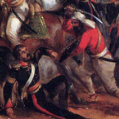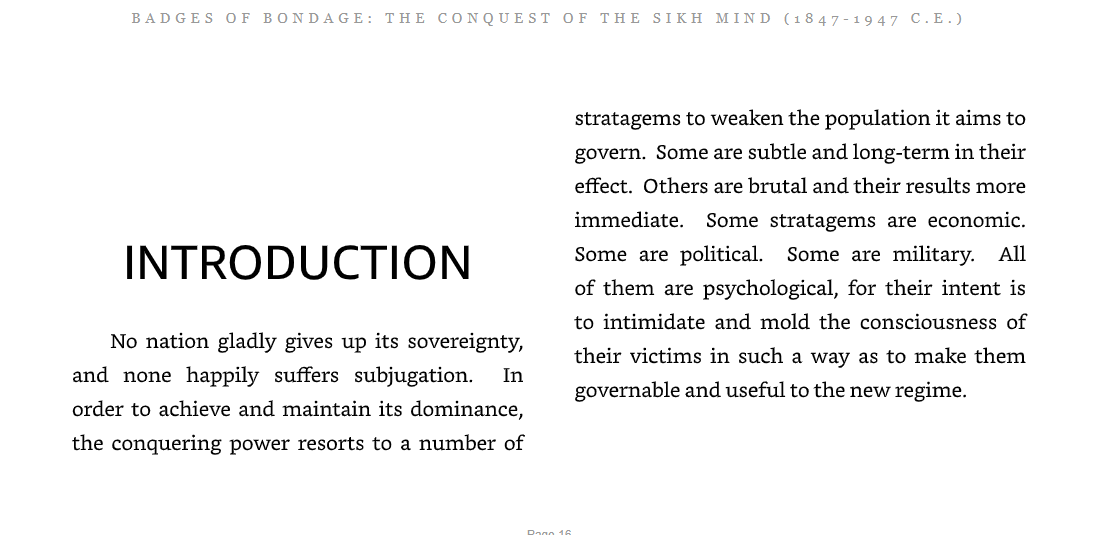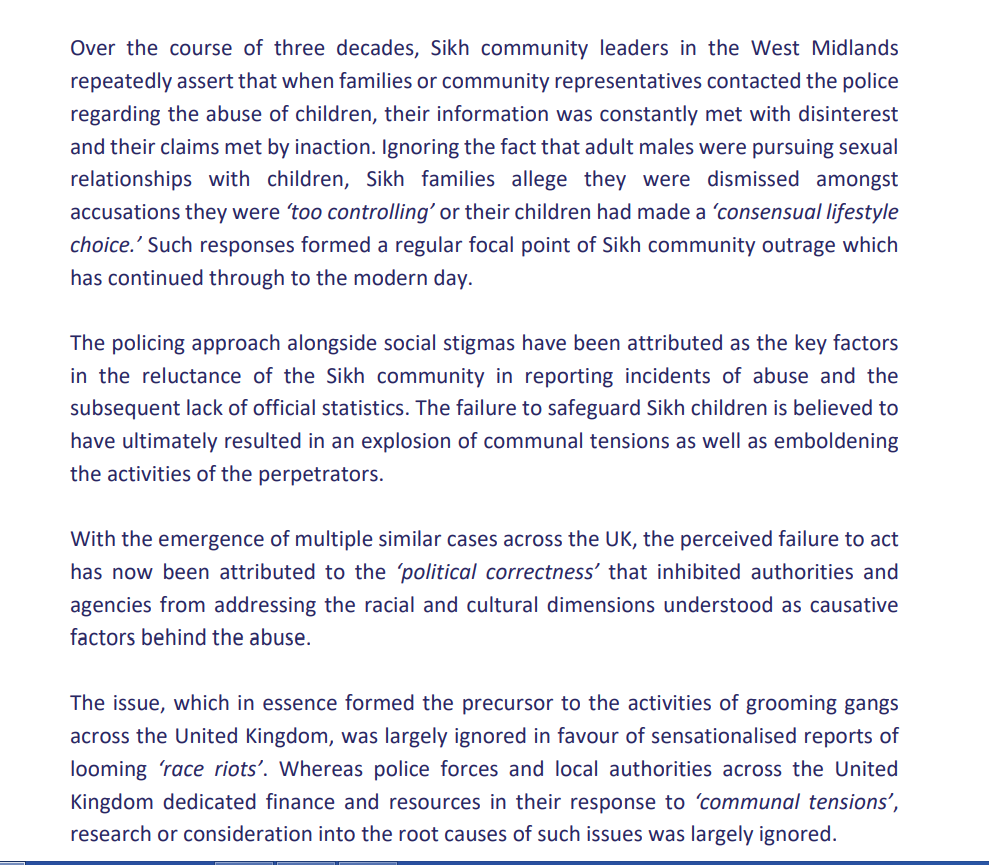-
Posts
9,150 -
Joined
-
Last visited
-
Days Won
234
Content Type
Profiles
Calendar
Forums
Everything posted by dallysingh101
-
I don't think it's like that. From what I gather psychopaths all have sociopathic traits but are willing to use direct violence. They get a kick out of the helplessness of the victim whilst they are torturing them. So it's like extreme sociopathy. It's like a power buzz from taking life. They make good hit men in criminal fraternities. Others serial killers and even soldiers. Sociopaths are generally less violent and more cerebral and tactical with their moves. They like to trap people in situations and drain them. They get a kick out of that control. Whilst they may not directly off someone, they still have no conscience and will create scenarios where people feel helpless enough to top themselves, even if these are family. They'll have no regret about this and will just move on to the next victim. They often do really well in business. They say that people are born with these traits or dispositions but sometimes they only get activated (or made prominent) through abuse (usually in childhood). But yes, some people seem born like this, even if they have loving supportive upbringings. Being spoilt seems to bring this out in many people too. It looks like a malfunction of the area of the brain that deals with empathy and emotion. It may be that this brain structure is biologically inherited, or that being raised by abusive parents makes the brain form in this way as a coping mechanism. Because these people can see others stripped of any emotional interpretation, they are able to make detailed detached observations of human behaviour and rely on this information to manipulate others vulnerabilities. They seem drawn to people with empathetic personalities or people who are vulnerable, like predators are to prey.
-
Mother claims her transgender daughter, 8, showed signs of wanting to be a girl when she was just a year old by using tea towels to pretend she had long hair - and tried to cut off her <banned word filter activated> aged 3 Jess Bratton, 25, from Stoke-on-Trent says Logan, 8, has 'always been a boy' Found child trying to cut off <banned word filter activated> with scissons when she was three Since then, has grown up as a girl, and loves to wear dresses and make-up After lockdown returned to school in a skirt and has blossomed in confidece https://www.dailymail.co.uk/femail/article-9933533/Mother-25-says-transgender-daughter-8-girl.html Note also how the DM seems to have failed in proof reading too.
-
Hundreds of children abused while in care of Lambeth council, inquiry finds This article is more than 1 month old Inquiry into child sexual abuse says abuse occurred over several decades on a scale ‘hard to comprehend’ Hundreds of vulnerable children in the care of Lambeth council in south London were subjected to horrendous cruelty and sexual abuse over several decades on a scale that was “hard to comprehend”, an independent inquiry report has found. The independent inquiry into child sexual abuse (IICSA) found more than 700 allegations of sexual abuse against hundreds of staff and individuals connected with just three homes in the borough. The true scale of abuse was likely to be far higher, it said. It said Lambeth council had allowed violence and sexual assault to flourish in its children’s residential homes, had failed to act against known abusers, or tackle the brutal, harsh and punitive culture of its homes – with devastating consequences for many children in its care. “It is hard to comprehend the cruelty and sexual abuse inflicted on children in the care of Lambeth council over many years, by staff, by foster carers and their families, and by volunteers in residential settings,” the report concludes. Although most of the children had been taken into care after suffering violence and neglect at the hands of family members, the report noted that for some “the experience they had [in the residential homes] was worse than living at home with their birth families”. The council failed on multiple occasions to protect children, including employing staff who it knew posed a risk to children, failing to investigate employees suspected of sexual abuse, and exposing children to situations where it knew they were at risk of abuse. The effect on many children in Lambeth’s care was devastating, the report says. As one witness, known as LA-A309, put it: “I felt from an early age that my feelings were inconsequential or of little value and that my pain didn’t matter. It was clear from an early age that no one really cared about me.” Over 40 years just one senior employee was disciplined for their part in the catalogue of abuse. Six perpetrators of sexual abuse connected to Lambeth homes, some of whom were council employees, were convicted of child sexual abuse between 1994 and 2019. Many staff in Lambeth children’s homes “demonstrated a callous disregard for the vulnerable children they were paid to look after”. Some failed to act when they knew about sexual abuse, and showed little compassion to the victims. “It was as if staff intended to create a harsh and punitive environment,” the report concludes. It is also critical of the children’s services inspectorate, Ofsted, and its predecessors, for failing to to do enough to identify the serious failures in services and staff practices, and the Metropolitan police for failing to properly investigate links between offenders identified in separate criminal investigations. IICSA has recommended the Metropolitan police investigate the case of one child, known as LA-A2, who was found dead in a bathroom in one of the homes, Shirley Oaks, in 1977. The report found the council had failed to inform the coroner that he had alleged he was sexually abused by a staff member there. The leader of Lambeth, Cllr Claire Holland, said: “Lambeth council wishes to re-state our sincere and heartfelt apology to all victims and survivors of abuse and neglect while in Lambeth’s care. The council was responsible for their care and protection but failed, with profound consequences. The council is deeply sorry for their experiences.” The report is scathing of what it calls the “progressive” leftwing culture of the council in the 1980s. “Many councillors and staff purported to hold principled and beliefs about tackling racism and promoting equality but in reality they failed to apply these principles to children in their care.” It notes that the overwhelming majority of children in its homes were black. At Shirley Oaks in 1980 57% of the children in care were black; at South Vale home children a decade later 85% of the children were black. “Racism was evident in the hostile and abusive treatment towards them by some staff.” The chair of the inquiry, Prof Alexis Jay, said the children in care were pawns in a “toxic power game” within the council in the 1980s and 90s, which was characterised over many years by bullying, racism, nepotism and sexism, against a backdrop of political chaos, corruption and financial mismanagement. She added: “This all contributed to allowing children in their care to suffer the most horrendous sexual abuse, with just one senior council employee disciplined for their part in it. We hope this report and our recommendations will ensure abuse on this scale never happens again.” The IICSA report is its third since 2018, following previous inquiries into Rochdale and Nottinghamshire councils. It focuses on conditions in five of Lambeth’s care homes in the borough from the late 60s, especially a period in the 70s and 80s when it says physical and sexual abuse in its children’s homes was “pervasive.” The Lambeth inquiry held five preliminary hearings between 2016 and 2020, and a final public hearing over four weeks in June and July last year, with evidence from 57 complainants, survivors and victims, from expert professional witnesses and former staff and councillors. A government spokesperson described the report as shocking, adding: “Protecting vulnerable children and keeping them safe from harm should be a top priority for local authorities, as well as for all those responsible for their care, including carers and the professionals working with them.” https://www.theguardian.com/uk-news/2021/jul/27/hundreds-of-children-abused-while-in-care-of-lambeth-council-inquiry-finds
-
Mother-of-three, 43, was left paralysed for two days and unable to breathe properly after her vape was spiked during a night out Emma Sugrue-Lawrence couldn't move normally for two days after incident She believes her vape was spiked with mamba spray and fears she might have been intended to be the victim of a sexual assault had she not been saved Her friend called paramedics to the Wolverhampton nightclub where they were Emma was taken unconscious to hospital and later made a full recovery https://www.dailymail.co.uk/news/article-9937585/Mum-paralysed-unable-breathe-vape-spiked-night-out.html
-
In 1846 C.E., when they had defeated the Sikh nation of Punjab, the officers of the British East India company found themselves in charge of a vast tract of land inhabited by a proud people with a history of surviving political and religious oppression. The Khalsa Sikhs, the order of "saint-soldiers" founded by Guru Gobind Singh in 1699 had weathered Mughal oppression and rebounded from two ghallugharas, or "holocausts" (1746 and 1762). When the Sikh confederacy was joined together by Maharaja Ranjeet Singh in 1801, it governed a domain the size of France. The Punjab was the last part of the Indian subcontinent to fall to the British, and two short years later, the Khalsa would rise again for a second Anglo-Sikh war (1848-49) before settling in, mostly, as loyal vassals of the British Crown.Badges of Bondage is an account of how the British managed to rule their Punjabi Sikh subjects for one hundred years. It is a story of their stratagems to diminish the beliefs and practices of their subjects, while presenting their own doctrines of government, education and justice, together with their race, culture and religion, as inherently superior. It is an historic account of self-assured agents of a Western power encountering a culture and people unlike any they had known: the Sikhs with their legendary thirst for fairness and their unmatched resilience in the face of adversity.This book, first published in 1996 and now updated and illustrated with historic photos and paintings, is a story of the successes and failures of the British to cow the Sikhs into subservience. It is also the account of a spiritual nation that at times stood as one against schemes and strategies employed by their rulers and their stooges to prolong British dominance of the people of south Asia, by far the richest and most important part of their global empire.Finally, this book is a preliminary assessment of long term effects, past India's proclamation of independence in 1947, of British rule on the habits, psyche and self-concept of Sikhs living today."Your essay makes very cogent reading and I enjoyed going through it. Your narration is powerful and effective." Professor Harbans Singh, The Encyclopedia of Sikhism, Punjabi University"Thoughtful people everywhere will be touched by Guru Fatha Singh's concern, as also benefit from a reading of his first book. His first set of documented writings, succinct and neatly produced, explore the Sikh faith through history. His loyalty to the Guru's purpose is firm as a rock. His understanding of Gurbani is extraordinarily perceptive, and their rendering into English sensitively poetic. His objective in compiling the historic panorama is to re-awaken the true spirit of Khalsa." Sardar Saran Singh, editor, The Sikh Review, Kolkata"The author rightly laments the surrender of the rich spiritual heritage of Sikhism to the so-called secular, materialistic and dehumanizing values of the West planted during British rule." Sardar Gurcharan Singh, Abstracts of Sikh Studies, Chandigarh“I am writing on behalf of the Siri Singh Sahib. The Siri Singh Sahib really enjoyed reading your book and was appreciative of the work that you have put in. You seem to have done considerable research which is well-documented. I also found your writing style comfortable to read, and it held my interest throughout. I felt your approach is sound, for while it does not actually point fingers and place blame, it makes clear that Sikhs themselves are accountable and responsible for their circumstances.” Singh Sahib Gurutej Singh Khalsa, Founder, Akal Security https://www.amazon.co.uk/Badges-Bondage-Conquest-1847-1947-C-ebook/dp/B08TBRNX95/ref=sr_1_291?dchild=1&keywords=sikh&qid=1630190127&s=books&sr=1-291
-

3 Punjabi men arrested in Canada for sex trafficking
dallysingh101 replied to Niara's topic in POLITICS | LIFESTYLE
-

3 Punjabi men arrested in Canada for sex trafficking
dallysingh101 replied to Niara's topic in POLITICS | LIFESTYLE
I think some higher ups are compromised by groomers who probably have photos/films of them. Some gangs have relatives in police and politics. Top down send strong messages to cover this stuff up. Even police men and women who tried to highlight the corruption have been screwed over. Look at Maggie Oliver and Jon Wedger. -

3 Punjabi men arrested in Canada for sex trafficking
dallysingh101 replied to Niara's topic in POLITICS | LIFESTYLE
Yeah, they are, and they adapt too. -

3 Punjabi men arrested in Canada for sex trafficking
dallysingh101 replied to Niara's topic in POLITICS | LIFESTYLE
Like I said, I think SYUK have filled this need. Plus any writer will straight away get put on intelligence services sh1t list. They harass you, f**k with your employment, try and ruin your reputation to undermine your message. -

3 Punjabi men arrested in Canada for sex trafficking
dallysingh101 replied to Niara's topic in POLITICS | LIFESTYLE
They aren't a gang anymore (if they ever where one) but some are clued up middle aged people who've pushed things behinds the scenes to get where we are now. Some have passed away. -

Taliban is in the news everywhere
dallysingh101 replied to californiasardar1's topic in POLITICS | LIFESTYLE
It's funny you say that! My childhood friends who were juts from africa with starched paghs and everything used to call me that! lol -

3 Punjabi men arrested in Canada for sex trafficking
dallysingh101 replied to Niara's topic in POLITICS | LIFESTYLE
-

3 Punjabi men arrested in Canada for sex trafficking
dallysingh101 replied to Niara's topic in POLITICS | LIFESTYLE
I think SYUK have done this now with social media, and magazines. Books seem to be the preserve of old school mfs like me these days? lol Plus you have grab them whilst their hot, I think the government has dedicated agencies to take them down asap. -

3 Punjabi men arrested in Canada for sex trafficking
dallysingh101 replied to Niara's topic in POLITICS | LIFESTYLE
^^^^ Only when all the stuff about gorian came out in the papers did certain people acknowledge the issue. It's funny seeing people who'd previous played it down, now sing the opposite song because of community pressure. lol Part of me wants to kick their heads in, but the wiser part of me says: "Chill, at least they got there in the end." -

3 Punjabi men arrested in Canada for sex trafficking
dallysingh101 replied to Niara's topic in POLITICS | LIFESTYLE
SP put out a few magazines through the underground. But remember anyone highlighting these things were attacked, especially from conservatives within the community for a long time. Having national, global communication channels like the internet and now Sikh TV channels has enabled what you talk about above in a way not previously possible. -

Jaats hurt by dhadi daler Kaur Khalsa comments!
dallysingh101 replied to shastarSingh's topic in WHAT'S HAPPENING?
No one attacked and subverted this old caste based thinking in India more than our Gurus. That's saying something. Jagjit Singh in his book, really brings that to life. Our movement has always been at the forefront of social and spiritual humanity and equality, way before any europeans ever conceived these ideas. The way Sikhi helped flatten society is unprecedented. Even a few early european writers comment on that. We've gone backwards and have become no different to Hindus now. Guru ji was called gareeb niwas in their own lifetime. There are scores of examples of their own sustained endeavours in trying to create a spiritually uplifted, socially fair, militarily proficient and confident society. That's at the core of Sikhi and explains our own unique culture, from langars to amrit sanchaar itself, including so called 'low caste' bhagat bani in maharaj. It's radical stuff in an Indian context. Look at how getting away from that has done nothing but weaken us. The existing attitudes even stops parchaar happening successfully because we look like some regional thing as shastar singh is alluding to these days. -

Jaats hurt by dhadi daler Kaur Khalsa comments!
dallysingh101 replied to shastarSingh's topic in WHAT'S HAPPENING?
Yes, it's a multifaceted and complex strategy that works on many dimensions. Especially to break us away from our ancient roots and moorings That's a common strategy of theirs too. Instead of creating 'greater unity' between 'Indians' and them, it also served to make people mentally accept their subjugation. If we know our ithiaas we know that two of the panj piaray came from areas far away from the north, and were fully accepted into the panth. Two piaray came from Maharastra and Odissa. I don't think they were the only Sikhs from these areas either, just the most well known ones. With euro theory, these people become racial 'others'. -

Jaats hurt by dhadi daler Kaur Khalsa comments!
dallysingh101 replied to shastarSingh's topic in WHAT'S HAPPENING?
It seems like we've got some dumbed down 'Sikhism' going on right now. I agree that there is a concerted effort to never rock the boat and keep status quos as exists (stayinyourplaceism as Gurjant aptly called it). I don't agree with you on certain points, I think wasps did sneak in the Aryan theories, and Scythian theories into the Panjab during colonialism, and this played a big part in solidifying caste along racial lines in a way never done previously. -

3 Punjabi men arrested in Canada for sex trafficking
dallysingh101 replied to Niara's topic in POLITICS | LIFESTYLE
It's more complicated than that. Look at how grooming was ignored for decades. Police, politicians and social services were unconcerned. Only afterwards did we find out how rampant it was and how even white girls were being abused in the thousands.




